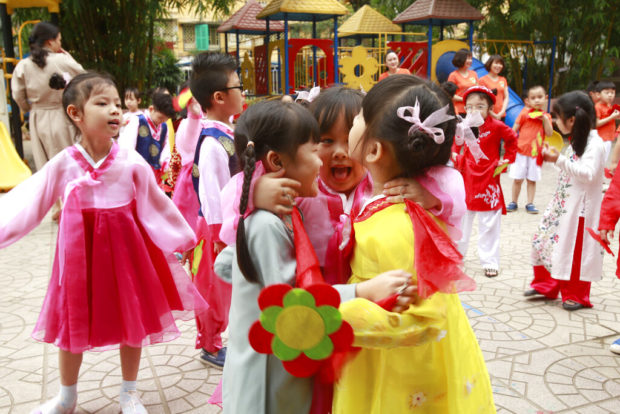
In this Feb. 21, 2019 photo, children in Vietnamese and Korean traditional costumes hug at each other at Vietnam-Korea Friendship Kindergarten in Hanoi, Vietnam. AP
HANOI, Vietnam — Children at a kindergarten in Hanoi, some in Korean traditional “Hanbok” dress, have been practicing singing and dancing, hoping to show off their talents to North Korean leader Kim Jong Un when he comes to town this week for his second summit with President Donald Trump.
Elsewhere in the Vietnam-Korea Friendship Kindergarten, students have been assembling picture montages on maps of Vietnam and the Koreas. In another classroom, children were coloring in Vietnamese and North Korean flags with which they hope to greet Kim.
“We really want for Mr. Kim Jong Un, the great leader of the Korean people, to visit our school,” said Ngo Thi Minh Ha, the school’s rector.
Apple-cheeked youngsters in traditional national garb meeting a paternal leader is a mainstay of old-style communist iconography, and North Korea is the closest thing left to an old-style communist state.
But the ties that once bound Vietnam to North Korea in their fight against the U.S. have long since frayed. These days, South Korea is the Korea most Vietnamese look to, as evidenced by Vietnam’s many billboards for the goods and services of companies such as Samsung, Lotte and Hyundai, and the massive amount of trade and investment coming from Seoul.
The kindergarten, however, swims against the tide of history. It was built in 1978, three years after the end of the Vietnam War, a gift from the North Korean government, which also supplied it with toys, musical instruments, tables, chairs and cookware, according to Hoang Thi Thanh, the school’s rector from 2002 to 2013.
The school initially had just four classrooms accommodating 120 children, but according to Thanh, “I was very happy and proud to be one of the first teachers of the school, because it was probably the most beautiful school in Hanoi at that time.”
It’s now a three-story complex with a large courtyard and a student body of 470 in a busy residential neighborhood with run-down, 1970s-era apartment buildings.
The students learn about North Korea, its leaders, landmarks and culture, lessons that are supplemented by a sister relationship with a kindergarten in Pyongyang with which visits are exchanged each year.
According to Thanh, there was a political hiccup in 2010, when the North Korean government proposed to rename the school after Kim Il Sung, North Korea’s founding father. Vietnam, whose ruling communist party has always favored collective leadership over personalized rule, demurred. A compromise was reached in which two classrooms were named after Kim Il Sung and Kim Jong Il — the grandfather and father, respectively, of Kim Jong Un — while a kindergarten classroom in Pyongyang was named after Vietnamese revolutionary hero Ho Chi Minh.
Ha, the rector, hopes Kim and Trump can achieve an agreement, and echoes the common sentiment that maybe Vietnam has something to teach North Korea, saying she hopes “the Korean people will enjoy peace and like the Vietnamese people, the Korean nation will embark on a reform process for development and prosperity.”
For local parents, however, education rather than politics is the main concern.
“I had checked out some kindergartens near my house, but I decided to send my son here, because this school has good facilities and good teachers,” Trieu Phuong Nhung said as she took her 4-year-old son to school. /ee